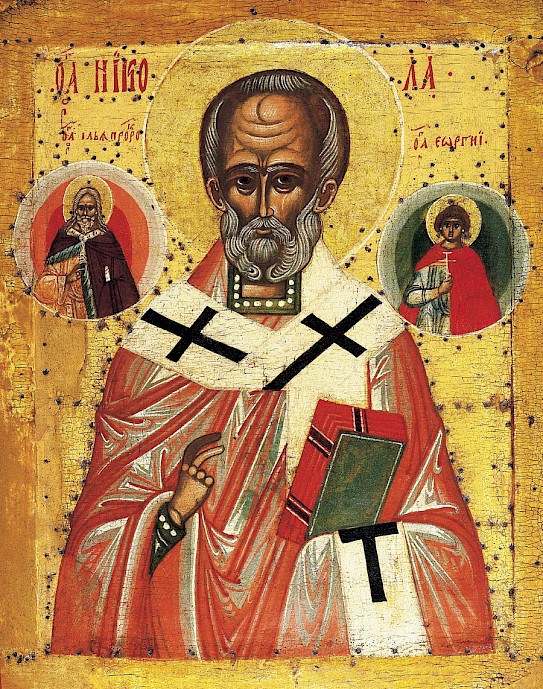
Today we celebrate the memory of one of the greatest saints of the Church of Christ, our holy father Nicholas, Archbishop of Myra the Miracle-Worker, who as no one else has been revered by all at all times and peoples of the world, not only Christians, but even Muslims and pagans.
“I see, brethren, a new sun rising above the earth and bringing sweet consolation to the sorrowful and suffering,” said the Bishop of Patara as he ordained Nicholas to the priesthood. “Joyous is the flock which will be under his ministry; he will strengthen them in faith in the Lord, he will guide them in goodness and piety, he will be an earnest helper to all those in need.”
St Nicholas’ entire life was a brilliant fulfillment of these prophetic words of the visionary bishop. St Nicholas burned with a passionate faith in God since his youth, being a strict, unbending zealot for the purity of Orthodox Christianity; he was a severe ascetic, in constant vigil, fasting and prayer; forgetting himself, he generously helped the needy, consoled the suffering, defended the innocently condemned; strengthening and guiding those who faltered in the faith; he never tired of performing all sorts of Christian acts of love and mercy to others.
18.12.2020Read more

Verses
Andrew bears crucifixion inverted,
Appearing truly and not as a shadow with feet upwards.
On the thirtieth Andrew the First-Called endured the cross.
Andrew was from the city of Bethsaida, the son of Jonah, and brother of Peter the Apostle. He was the first disciple of John the great Forerunner and Baptist. Later, when he heard his Teacher say, while pointing to Jesus Christ, "Behold the Lamb of God Who takes away the sins of the world," he left the Forerunner and followed Christ. And to his brother the Pre-eminent Peter he said, "We have found the Messiah." With these words he drew Peter towards spiritual eros for Christ. And there are many other things that are found in the divinely-inspired Scriptures regarding this Apostle.
12.12.2020Read more
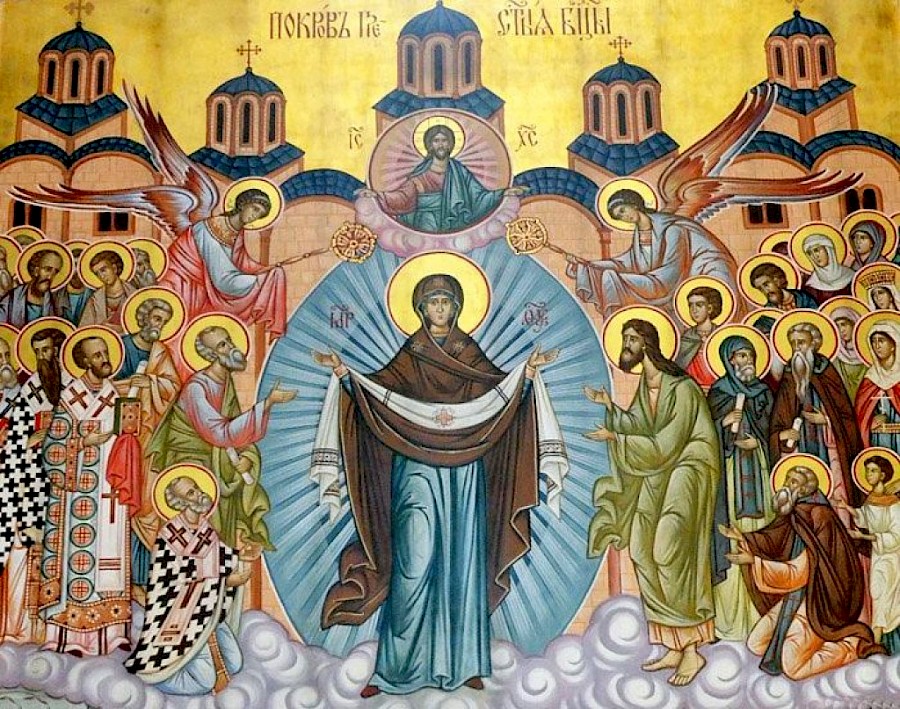
In the days of one’s earthly wandering, a person often has need of heavenly aid. Just as a traveler who has lost his way during a stormy winter night eagerly looks around him to see whether there’s a glimmer of light anywhere, so we, too, in difficult moments of our life, when it seems to us that there is no way out, - unconsciously look upward, towards the Giver of all bounties, the Lord God.
A vivid example of such a situation is presented in the event which gave rise to today’s holiday.
This took place more than a thousand years ago, when Asian hordes of savage Saracens invaded Byzantium, our sister in faith, pillaging everything in their path with fire and sword. The Greeks shut themselves up in Constantinople and fearfully awaited inevitable death, since the enemy had already reached the walls of the city. They could not expect help from anywhere, while their own military forces were insignificant. However, the Christians felt that not everything was lost yet, since the impossible for man is quite possible for God.
13.10.2020Read more
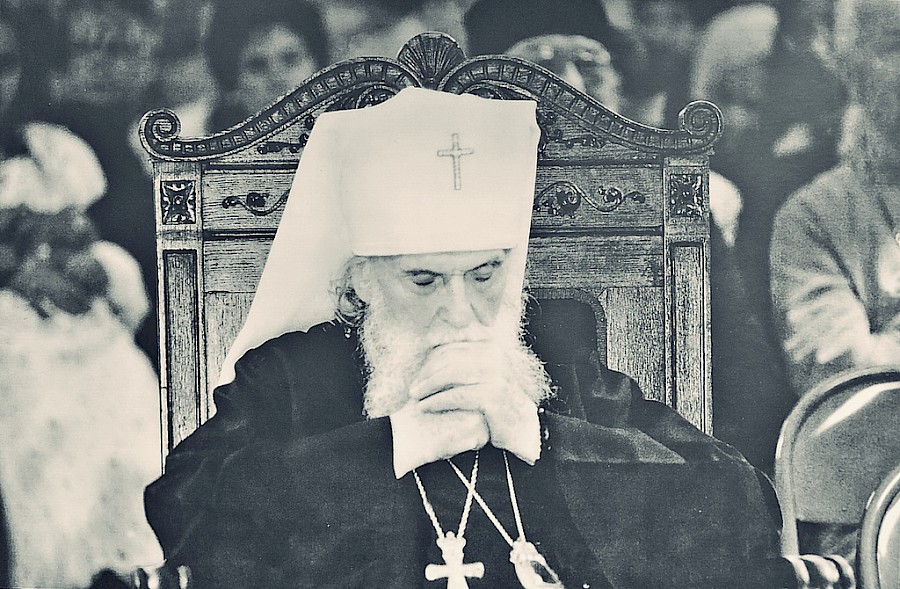
The 14st anniversary of the repose of His Eminence, Metropolitan Vitaly, First Hierarch of the Russian Orthodox Church Abroad. Vladyka reposed on the feast day of the Apodosis of the Nativity of the Theotokos, September 25, 2006. Memory eternal to Vladyka Vitaly. - Edit.
Our pastors and their flocks currently live under unique conditions, which, without the slightest exaggeration or mystical passion, can be referred to as pre-apocalyptic. Already, throughout the world, there is not a single leader or government that leads its people with any reference to God's mercy or the grace of the Holy Spirit. The Anointed of God has been taken from the world, the epoch of Constantine, of government by God's grace, has come to an end. The last book of Scriptures has opened, that of St. John the Theologian. The power of Orthodox Russia, the heiress of the Byzantine empire, no longer exists. Two forces have divided the world between them: on one side the militant, godless communist, on the other, the so-called democratic, western world, in which the flame of freedom continues to flicker. The latter, for the casual observer, is divided into countless Christian and non-Christian religions and sects, which inwardly are cemented together by an anti-Christian spirit.
25.09.2020Read more
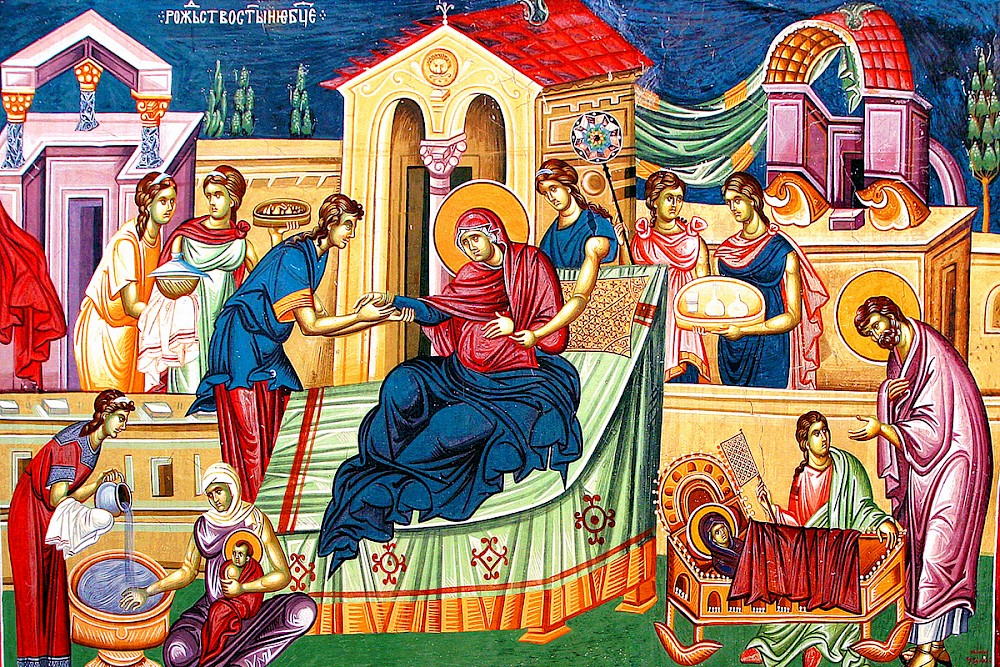
When people fervently await a certain day, the appearance of the dawn of that day is a great joy. Just as the dawn precedes the bright sun of the day, people were elated at the birth of the Most-Holy Virgin Mary, which preceded the birth of Christ, the Savior of the World.
Of course, by no means did all people await Christ. Of those who did, only a very few saw in the birth of the Most-Holy Virgin the heralding of the coming of Christ.
The overwhelming majority of mankind was accustomed to indifference in this regard. Christ, the Savior and Deliverer from the burdens of earthly life, was actually anticipated by many: tens or hundreds of thousands, or maybe even millions of people not only in Israel but among some of the pagans awaited salvation.
20.09.2020Read more
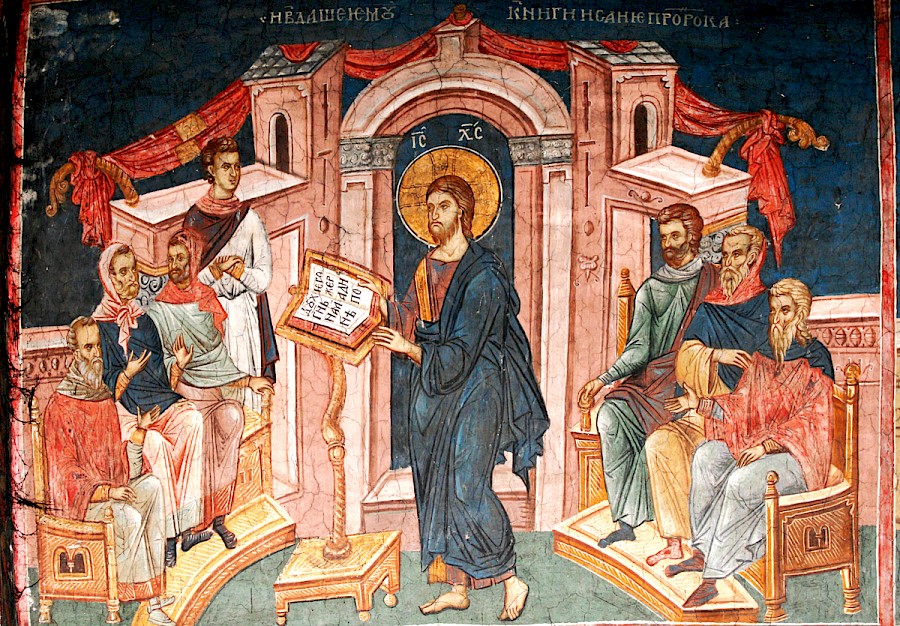
The First Ecumenical Council [Nicaea, 325] decreed that the Church year should begin on September 1. The month of September was, for the Hebrews, the beginning of the civil year (Exodus 23:16), the month of gathering the harvest and of the offering of thanks to God. It was on this feast that the Lord Jesus entered the synagogue in Nazareth (Luke 4:16-21), opened the book of the Prophet Isaiah and read the words: The Spirit of the Lord God is upon Me; because the Lord hath anointed Me to preach good tidings unto the meek; He hath sent Me to bind up the brokenhearted, to proclaim liberty to the captives, and the opening of the prison to them that are bound; to proclaim the acceptable year of the Lord, and the day of vengeance of our God; to comfort all that mourn (Isaiah 61:1-2). The month of September is also important in the history of Christianity, because Emperor Constantine the Great was victorious over Maxentius, the enemy of the Christian Faith, in September. Following this victory, Constantine granted freedom of confession to the Christian Faith throughout the Roman Empire. For a long time, the civil year in the Christian world followed the Church year, with its beginning on September 1. The civil year was later changed, and its beginning transferred to January 1. This occurred first in Western Europe, and later in Russia, under Peter the Great.
St. Nikolai Velimirovic, Prologue of Ohrid.
Troparion — Tone 2
O Creator of the universe, / Thou didst appoint times by Thy power; / bless the crown of this year with Thy goodness, O Lord. / Preserve in safety Thy rulers and cities: / and through the intercessions of the Theotokos, save us!
Kontakion — Tone 4
O Creator and Master of time and the ages, / Triune and Merciful God of all: / grant blessings for the course of this year, / and in Thy boundless mercy save those who worship Thee and cry out in fear: / “O Savior, grant blessings to all mankind!”
14.09.2020Read more
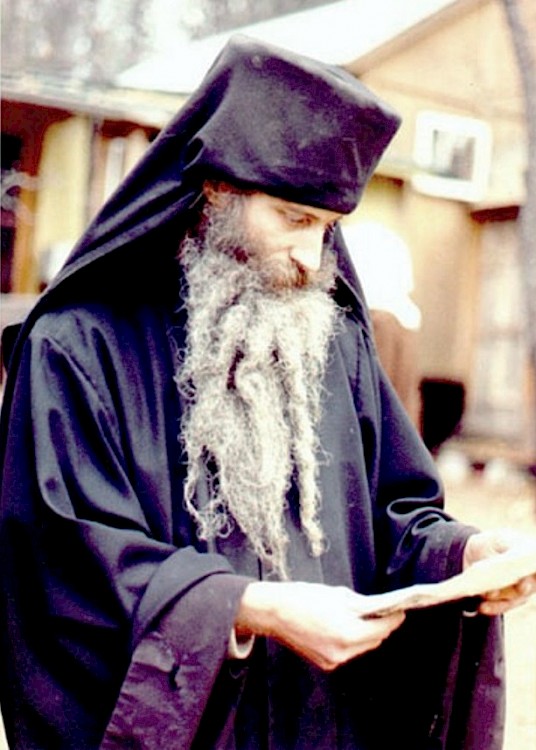
Dear brother in Christ:
Greetings in our Lord Jesus Christ! Thank you for your letter. I appreciate the seriousness of what you have written, and I will reply with the same seriousness.
I must tell you first of all that, to the best of our knowledge, there are no startsi today – that is, truly God-bearing elders (in the spirit of the Optina elders) who could guide you not by their own wisdom and understanding of the Holy Fathers, but by the enlightenment of the Holy Spirit. This kind of guidance is not given to our times – and frankly, we in our weakness and corruption and sins do not deserve it[1].
02.09.2020Read more

“Magnify O my soul, the honourable Translation of the Mother of God from earth to heaven.”
(Refrain for the 9th Ode of the Canon)
Let us be happy, beloved brothers and sisters that we belong to the Holy Orthodox Church, worthily and rightly glorifying the Most Holy Sovereign Theotokos on this eminent day out of all the days of the year with special solemnity. There exists on earth many societies and entire governments that do not consider the need nor the obligation to call upon and glorify the Queen of heaven and earth, the Mother of Our Divine Lord Jesus Christ, and other saints and angels; to submissively serve Her lovingly, as the true Mother of God. Sadly in Russia nowadays we have heretics (among us) who actively dishonor the Mother of God, the saints, their icons, their relics and their festivals. O, if only they also unanimously with us glorified the worthy Queen of heaven and earth!
28.08.2020Read more
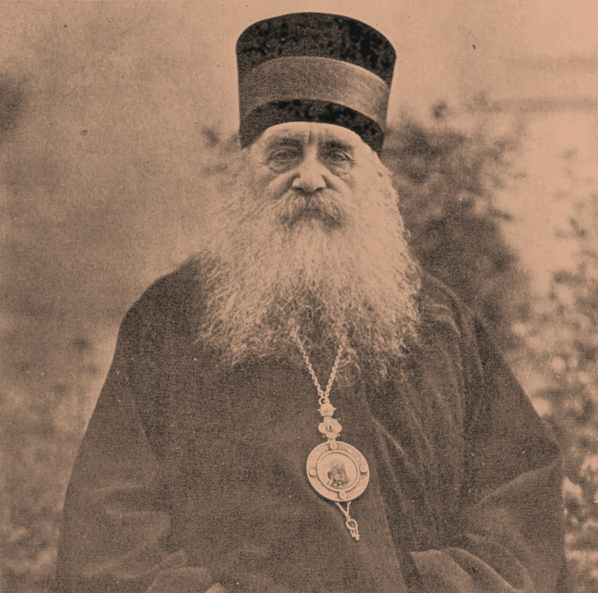
The 84st anniversary of the repose of His Beatitude Metropolitan Anthony (Khrapovitsky), the First Hierarch of the Russian Orthodox Church Abroad. Vladyka reposed on the feast day of the Smolensk Hodigitria August 10, 1936. Memory eternal to Vladyka Anthony. - Edit.
I.
I find myself in the position of an ant who must speak about the soarings of an eagle. Can an ant follow the path of an eagle? No! However, it is possible, from its ant's perspective, for it to admire the eagle soaring in the heavens, and to stand frozen by the awe of sweet delight.
Therefore, with my ant's tongue I want to babble on with some of my observations, and I ask you to pardon an ant, that he dare to speak of an eagle of Orthodoxy. Oh! I am firmly convinced that I possess neither the skill nor the capability to explain the mystery of the wondrous personality of His Beatitude, Metropolitan Anthony, but I am only able to bow down, in fervent awe and pious respect, before the wonders of his boundless love for Christ and his gracious love for man.
10.08.2020Read more
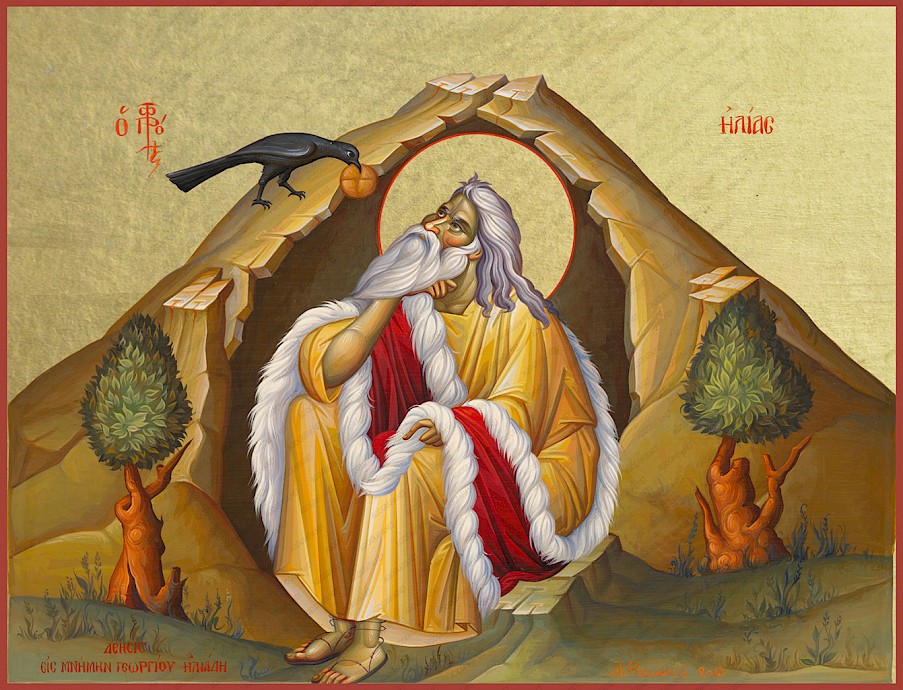
“An angel in the flesh and the cornerstone of the prophets, the second forerunner of the coming of Christ…” With these words the Holy Church glorifies the great Old Testament righteous man who lived 900 years before Christ - the glorious holy prophet of God, Elijah. By his unusually strict ascetic life, he appeared more like an angel than a man.
But why does the Holy Church calls him “a second forerunner of the second coming of Christ”?
This is because, just as before the first coming of Christ in the world, St. John the Baptist appeared “in the spirit and power of Elijah” (Lk1:17), so also before the second coming of Christ on earth the Prophet Elijah himself will appear (see. Malachi 4:5). As we know, he did not die but was lifted up to heaven alive, with his flesh, in a chariot of fire (see para. 4 Kings 2, 11).
01.08.2020Read more










